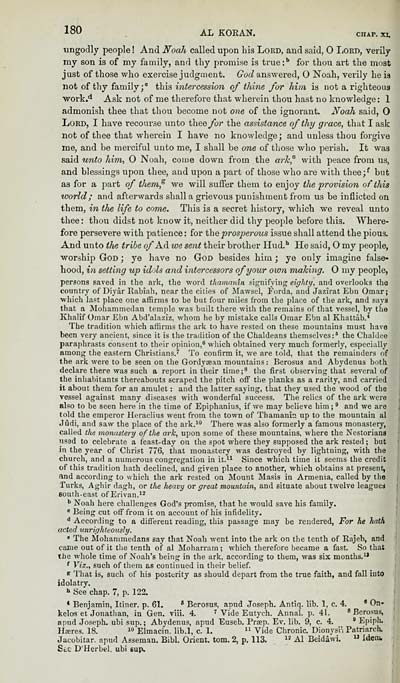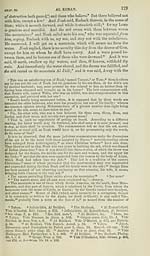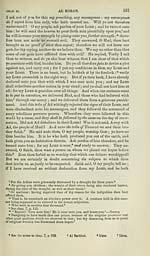Download files
Complete book:
Individual page:
Thumbnail gallery: Grid view | List view

180 AL KORAN. CHAP. XI,
ungodly people ! And Noah called upon his Lord, and said, O liOBD, verily
my son is of my family, and thy promise is true:** for thou art the most
just of those who exercise judgment. God answered, O Noah, verily he ia
not of thy family;' this intercession of thine for him is not a righteous
work.** Ask not of me therefore that wherein thou hast no knowledge: 1
admonish thee that thou become not one of the ignorant. Noah said, O
Lord, I have recourse unto thee ybr the assistance of thy grace, that I ask
not of thee that wherein I have no knowledge; and unless thou forgive
me, and be merciful unto me, I shall be one of those who perish. It was
said unto him, Noah, come down from the ark,° with peace from us,
and blessings upon thee, and upon a part of those who are with thee;*" but
as for a part of them,^ we will suffer them to enjoy the provision of this
world ; and afterwards shall a grievous punishment from us be inflicted on
them, in tlte life to com^. This is a secret history, which we reveal unto
thee: thou didst not know it, neither did thy people before this. Where-
fore persevere with patience: for the prospe7-ous issue shall attend the pious.
And unto the tribe of Ad we sent their brother Hud.'' He said, my people,
worship God ; ye have no God besides him ; ye only imagine false-
hood, in setting up id'>ls and intercessors of your own mahing. O my people,
persons saved in the ark, the word thamnnin sip^nifviiig eighty, and overlooks the
country of Diyar Rabiah, near the cities of JMavvsel, Forda, and Jazirat Ebn Omar;
wliich last place one affirms to be but four miles from the place of the ark, and says
that a Mohammedan temple was built there with the remains of that vessel, by the
Khalif Omar Ebn Abd'alaziz, whom he by mistake calls Omar Ebn al Khattab.*
The tradition which affirms the ark to have rested on these mountains must have
been very ancient, since it is tlie tradition of the Chaldeans themselves:' the Chaldee
paraphrasts consent to their opinion,* wliich obtained very much formerly, especially
among the eastern Christians.^ To confirm it, we are told, that the remainders of
the ark were to be seen on the Gordysean mountains: Berosus and Abydenus both
declare there was such a report in their time;* the first observing that several of
the inhabitants thereabouts scraped the pitch off the planks as a rarity, and carried
it about them for an amulet : and the latter saying, that they used the wood of the
vessel against many diseases with wonderful success. The relics of the ark were
also to be seen here in the time of Epiphanius, if we may believe him ; * and we are
told the emperor Heraclius went from the town of Thamanin up to the mountain al
Judi, and saw the place of the ark.^* There was also formerly a famous monastery,
called the monastery of the ark, upon some of these mountains, where the Nestorians
nsad to celebrate a feast-day on the spot where they supposed the ark rested; but
in the year of Christ 776, that monastery was destroyed by lightning, with the
church, and a numerous congregation in it.^^ Since which time it seems the credit
of this tradition hath declined, and given place to another, which obtains at present,
and according to which the ark rested on Mount Masis in Armenia, called by the
Turks, Aghir dagh, or the heavy or great mountain, and situate about twelve leagued j
south-east of Erivan.^^ 1
'' Noah here challenges God's promise, that he would save his family. j
" Being cut off from it on account of his infidelity. i
^ According to a different reading, this passage may be rendered. For he hath
acted unrighteously.
' The Mohammedans say that Noah went into the ark on the tenth of Rajeb, and
came out of it the tenth of al Moharram; which therefore became a fast. So that
the whole time of Noah's being in the ark, according to them, was six months. i*
' Viz., such of them as continued in their belief.
K That is, such of his posterity as should depart from the true faith, and fall into
idolatry.
•^ See chap. 7, p. 122.
* Benjamin, Itiner. p. 61. * Berosus, apud Joseph. Antiq. lib. 1, c. 4. • On-
kelos et Jonathan, in Gen. viii. 4. ^ "Vide Eutych. AnnaL p. 41. « Berosus,
apud Joseph, ubi sup.; Abydenus, apud Euseb. Praep. Ev. lib. 9, c. 4. » Epiph.
Hares. 18. lo Elmacin. lib.l, c. 1. ^^ Vide Chronic. Dionysi=, Patriarch.
Jacobitar. apud Asseman. Bibl. Orient, torn. 2, p. 113. " Al Beidawi. " Idem.
StC D'Herbel. ubi sup.
ungodly people ! And Noah called upon his Lord, and said, O liOBD, verily
my son is of my family, and thy promise is true:** for thou art the most
just of those who exercise judgment. God answered, O Noah, verily he ia
not of thy family;' this intercession of thine for him is not a righteous
work.** Ask not of me therefore that wherein thou hast no knowledge: 1
admonish thee that thou become not one of the ignorant. Noah said, O
Lord, I have recourse unto thee ybr the assistance of thy grace, that I ask
not of thee that wherein I have no knowledge; and unless thou forgive
me, and be merciful unto me, I shall be one of those who perish. It was
said unto him, Noah, come down from the ark,° with peace from us,
and blessings upon thee, and upon a part of those who are with thee;*" but
as for a part of them,^ we will suffer them to enjoy the provision of this
world ; and afterwards shall a grievous punishment from us be inflicted on
them, in tlte life to com^. This is a secret history, which we reveal unto
thee: thou didst not know it, neither did thy people before this. Where-
fore persevere with patience: for the prospe7-ous issue shall attend the pious.
And unto the tribe of Ad we sent their brother Hud.'' He said, my people,
worship God ; ye have no God besides him ; ye only imagine false-
hood, in setting up id'>ls and intercessors of your own mahing. O my people,
persons saved in the ark, the word thamnnin sip^nifviiig eighty, and overlooks the
country of Diyar Rabiah, near the cities of JMavvsel, Forda, and Jazirat Ebn Omar;
wliich last place one affirms to be but four miles from the place of the ark, and says
that a Mohammedan temple was built there with the remains of that vessel, by the
Khalif Omar Ebn Abd'alaziz, whom he by mistake calls Omar Ebn al Khattab.*
The tradition which affirms the ark to have rested on these mountains must have
been very ancient, since it is tlie tradition of the Chaldeans themselves:' the Chaldee
paraphrasts consent to their opinion,* wliich obtained very much formerly, especially
among the eastern Christians.^ To confirm it, we are told, that the remainders of
the ark were to be seen on the Gordysean mountains: Berosus and Abydenus both
declare there was such a report in their time;* the first observing that several of
the inhabitants thereabouts scraped the pitch off the planks as a rarity, and carried
it about them for an amulet : and the latter saying, that they used the wood of the
vessel against many diseases with wonderful success. The relics of the ark were
also to be seen here in the time of Epiphanius, if we may believe him ; * and we are
told the emperor Heraclius went from the town of Thamanin up to the mountain al
Judi, and saw the place of the ark.^* There was also formerly a famous monastery,
called the monastery of the ark, upon some of these mountains, where the Nestorians
nsad to celebrate a feast-day on the spot where they supposed the ark rested; but
in the year of Christ 776, that monastery was destroyed by lightning, with the
church, and a numerous congregation in it.^^ Since which time it seems the credit
of this tradition hath declined, and given place to another, which obtains at present,
and according to which the ark rested on Mount Masis in Armenia, called by the
Turks, Aghir dagh, or the heavy or great mountain, and situate about twelve leagued j
south-east of Erivan.^^ 1
'' Noah here challenges God's promise, that he would save his family. j
" Being cut off from it on account of his infidelity. i
^ According to a different reading, this passage may be rendered. For he hath
acted unrighteously.
' The Mohammedans say that Noah went into the ark on the tenth of Rajeb, and
came out of it the tenth of al Moharram; which therefore became a fast. So that
the whole time of Noah's being in the ark, according to them, was six months. i*
' Viz., such of them as continued in their belief.
K That is, such of his posterity as should depart from the true faith, and fall into
idolatry.
•^ See chap. 7, p. 122.
* Benjamin, Itiner. p. 61. * Berosus, apud Joseph. Antiq. lib. 1, c. 4. • On-
kelos et Jonathan, in Gen. viii. 4. ^ "Vide Eutych. AnnaL p. 41. « Berosus,
apud Joseph, ubi sup.; Abydenus, apud Euseb. Praep. Ev. lib. 9, c. 4. » Epiph.
Hares. 18. lo Elmacin. lib.l, c. 1. ^^ Vide Chronic. Dionysi=, Patriarch.
Jacobitar. apud Asseman. Bibl. Orient, torn. 2, p. 113. " Al Beidawi. " Idem.
StC D'Herbel. ubi sup.
Set display mode to: Large image | Transcription
Images and transcriptions on this page, including medium image downloads, may be used under the Creative Commons Attribution 4.0 International Licence unless otherwise stated. ![]()
| Early Gaelic Book Collections > J. F. Campbell Collection > Koran: or, Alcoran of Mohammed > (334) |
|---|
| Permanent URL | https://digital.nls.uk/77137769 |
|---|
| Description | Volumes from a collection of 610 books rich in Highland folklore, Ossianic literature and other Celtic subjects. Many of the books annotated by John Francis Campbell of Islay, who assembled the collection. |
|---|
| Description | Selected items from five 'Special and Named Printed Collections'. Includes books in Gaelic and other Celtic languages, works about the Gaels, their languages, literature, culture and history. |
|---|

